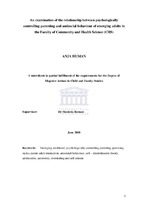| dc.contributor.advisor | Roman, Nicolette | |
| dc.contributor.author | Human, Anja | |
| dc.contributor.other | NULL | |
| dc.contributor.other | Faculty of Community and Health Sciences | |
| dc.date.accessioned | 2013-09-03T13:33:56Z | |
| dc.date.available | 2011/03/04 11:27 | |
| dc.date.available | 2011/03/04 | |
| dc.date.available | 2013-09-03T13:33:56Z | |
| dc.date.issued | 2010 | |
| dc.identifier.uri | http://hdl.handle.net/11394/2024 | |
| dc.description | Magister Artium (Child and Family Studies) - MA(CFS) | en_US |
| dc.description.abstract | Parents are important in the socialization of children to develop into adjusted adults. Parenting is a developmental process and encourages the child to become an independent adult in society, an adult who is pro-social rather than anti-social. The main aim of parenting is to control the behavior of the child, but as the child matures the approach is more of monitoring and supervision rather than control. The aim of this study is to establish the prevalence of parental psychological control during the phase of emerging adulthood and this will be associated with the anti-social behavior of emerging adults. A quantitative methodological approach was used to conduct the study. A sample of 382 participants aged 18 to 25 years were randomly stratified across the departments in the Faculty of Community and Health Sciences (CHS). The Parental Psychological Control (Barber, 1996) and the Anti-Social Behavior (Achenbach and Edelbrock, 1987) questionnaires were used to collect the data. The data were analyzed by means of the Statistical Package for Social Sciences (SPSS). Results show a significant positive relationship between perceived psychologically controlling parenting and antisocial behavior of emerging adults. Furthermore, antisocial behavior is also positively predicted by both mother and father psychological control, with mothers being significantly more psychologically controlling than fathers. When comparing males and females, males engaged significantly more in antisocial activities than females; males also found fathers to be more psychologically controlling. Implications for further research are suggested. | en_US |
| dc.language.iso | en | en_US |
| dc.publisher | University of the Western Cape | en_US |
| dc.subject | Psychologically controlling parenting | en_US |
| dc.subject | Parenting styles | en_US |
| dc.subject | Parent-adult interaction | en_US |
| dc.subject | Antisocial behaviour | en_US |
| dc.subject | Self determination theory | en_US |
| dc.subject | Adolescents | en_US |
| dc.subject | Autonomy | en_US |
| dc.subject | Monitoring and self esteem | en_US |
| dc.title | An examination of the relationship between psychologically controlling parenting and antisocial behavior of emerging adults in the Faculty of Community and health Science (CHS) | en_US |
| dc.type | Thesis | en_US |
| dc.rights.holder | University of the Western Cape | en_US |
| dc.description.country | South Africa | |

